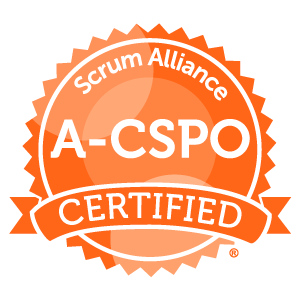 Our new Advanced Certified Scrum Product Owner (A-CSPO) workshop will help you level up your skills and earn advanced certification. All this on a flexible timeline that works with your busy schedule.
Our new Advanced Certified Scrum Product Owner (A-CSPO) workshop will help you level up your skills and earn advanced certification. All this on a flexible timeline that works with your busy schedule.
Read the full article…
Author Archives: Chris Sims
Testing Product Hypotheses Before Implementation

Photo by National Cancer Institute
Read the full article…
Testing Product Hypotheses With A Minimal Viable Product (MVP)
 A previous article described how a scrum team could measure the value delivered by completed product backlog items. The approach is based on creating a product hypothesis for each item, describing how the value will be measured. By implementing an item (user story) and then measuring the results, the team is conducting an experiment to validate their beliefs about the value of the item.
A previous article described how a scrum team could measure the value delivered by completed product backlog items. The approach is based on creating a product hypothesis for each item, describing how the value will be measured. By implementing an item (user story) and then measuring the results, the team is conducting an experiment to validate their beliefs about the value of the item.
A minimal viable product (MVP) allows us to implement less than the full feature, and still gather data about how valuable users find it. While an MVP is often used to test an entire product idea, the approach can also be used to test new feature areas of an existing product. An MVP is a simple implementation that allows us to gather real data from our users. Read the full article…
Measuring Value With Product Hypotheses

Photo by Hans Reniers
Sadly, most teams never measure the value of what they create, and thus they continue to invest in building those aspects that aren’t delivering value. Measuring value allows the product owner to direct the team’s focus toward the 20 percent of features that hold most of the value. Read the full article…
How To Create A User Persona

Photo by Tyler Nix
Here’s how to create a persona to represent a group of users, customers, or other stakeholders of your team’s product. Read the full article…
Steve Bockman: Rest In Peace
 This morning I woke to the sad news that Steve Bockman passed away. Steve was a friend, co-worker, creator, problem solver, agilist, and one of my heroes. Steve worked at Agile Learning Labs from 2009 – 2012. In his Hawaiian shirts, his presence was always fun, friendly, and engaging.
This morning I woke to the sad news that Steve Bockman passed away. Steve was a friend, co-worker, creator, problem solver, agilist, and one of my heroes. Steve worked at Agile Learning Labs from 2009 – 2012. In his Hawaiian shirts, his presence was always fun, friendly, and engaging.
Read the full article…
Tips For Your Agile Job Search
 Are looking to get an agile job, such as scrum master, product owner, or developer on a scrum team? I recommend using scrum to structure your job search. A job search is complex work, full of unknown unknowns. That’s exactly the sort of work that scrum is good for. Additionally, using scrum and related agile techniques to structure your job search will grow your agile knowledge and skills. Here are a few thoughts on how to use scrum to support your agile job search.
Are looking to get an agile job, such as scrum master, product owner, or developer on a scrum team? I recommend using scrum to structure your job search. A job search is complex work, full of unknown unknowns. That’s exactly the sort of work that scrum is good for. Additionally, using scrum and related agile techniques to structure your job search will grow your agile knowledge and skills. Here are a few thoughts on how to use scrum to support your agile job search.
Read the full article…
Strategic Planning For Scaled-Up Scrum: An Overview
 Here’s an overview of one approach to doing strategic planning in a scaled-up scrum environment. We’ll use twelve weeks as our planning horizon, though the approach works fine for shorter periods as well. We’ll start by looking at how a single team could plan for such a time horizon on their own without considering the broader organizational context, and build up from there.
Here’s an overview of one approach to doing strategic planning in a scaled-up scrum environment. We’ll use twelve weeks as our planning horizon, though the approach works fine for shorter periods as well. We’ll start by looking at how a single team could plan for such a time horizon on their own without considering the broader organizational context, and build up from there.
Read the full article…
Your First Year As A Scrum Master
You’ve put in the work and you’ve secured your very first job as a scrum master. Congratulations! Now what? Your first scrum master job is an exciting time for growth and change – for yourself and for your teams. It can also be scary, stressful, and mystifying. If you’re experiencing all of these feelings, you are not alone. Here’s what you can expect in your first scrum master year.
Read the full article…
I’m New To Scrum

I’ve never worked in tech, nor used scrum, but people tell me I’d make a good scrum master. Where should I start?
I get this question from time to time. In fact, I got it today. A good starting point is to read some short introductory articles and watch some videos. Here’s a collection that I recommend.

